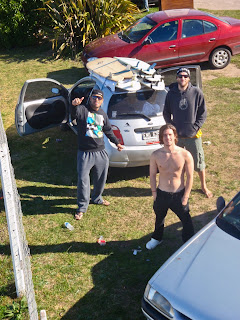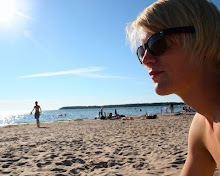One of first the things you'll notice in Argentina is the language.
It's Spanish but in the beginning, you'll have hart time realizing it. Forget Los Serranos, most of your Spanish lessons and all the bad words you've learned from your Spanish Erasmus friends. (Btw thank you guys, one day I'll still visit you and get to use them!) ;)
First of all, call the language Castellano (~caste-sshano), in Spain you can speak Spanish (español). Here's some tips how to get along in Argentina.
1. Quick Español --> Castellano transform:
A. Pronounce 'll' and 'y' as 'shh', not as 'jj', for ex.
yo --> ssho (I), playa --> pla-ssha (beach) and calle --> ca-sshe (streat)
B. Change the pronouns 'tu' --> 'vos' (you) and 'vosotros' --> 'ustedes' (you guys). Use the form 'usted' bit too much, it's a better mistake anyway.
'Ustedes' has the same conjugations as the pronoun 'them', for ex. ustedes tienen (you guys have). Say 'vos sos', not 'tu eres' (you are), otherwise use the learned conjugations. It's not 100% correct, but they'll get it.
C. Don't whisper, there is no "th" sound (as in "the" or "thick") in Castellano. Pronounce 's', 'ci', 'ce' and 'z' like 's'. For ex.
gracias --> 'grasias' (thanks), celcius --> 'selsius' (°C) and pizza --> 'pissa'
D. Tune up your Argentinean small talk:
In Spain In Argentina
¡Hola! *kiss kiss* ¡Hola! *kiss*
¿Qué tal? - Bien, ¿y tú? ¿Cómo andás? - Bien, tranquilo, ¿y vos?
...bla bla... ..che bla bla..
¡Hasta luego! ¡Nos vemos!
¡Ciao! *kiss kiss* ¡Chau! *kiss*
E. Buy the book ¡Che Boludo! and read it on the plane.
F. When you are there, read the people, be polite and smile when they do. That's how I survived the first years in Berlin before learning German! :D
2. Bit more:
To be correct, the language is called Rio Platense, Argentina and Uruguay share the same language. Because of the history, it has also great influences from Portuguese and Italian. It has an own pronunciation, bunch of vocabulary and and a minor grammatical change. Here are some differences to European Spanish (according to different sources and my own experience):
Vos
The pronoun 'vos' has also its own verb conjugations. The differences are in the simple present and command (imperative) forms. To make the long story short:
a) To form the simple present, change r --> s, forget the diphthongs and mark the accented syllabse to last vocal. 'Sos' (ser) and 'vas' (ir) are the only exceptions.
b) To form the command form, drop the r in the end and mark the accented syllabse to last vocal. 'Se' (ser) and 'andá' (ir/ andar) are the only exceptions.
Rioplatense Spanish
ir (go) vos vas, ¡andá! (tu vas, ¡ve!)
ser (be) vos sos, ¡se! (tu eres, ¡sé!)
estar (be) vos estás ¡está! (tu estas, ¡esta!)
caminar (walk) vos caminás, ¡caminá! (tu caminas, ¡camina!)
querer (want) vos querés, ¡queré! (tu quieres, ¡quiere!)
tener (have) vos tenés, ¡tené! (tu tienes, ¡ten!)
decir (say) vos decís, ¡decí! (tu dices, ¡diz!)
venir (come) vos venís, ¡vení! (tu vienes, ¡ven!)
etc.
According to one article, you can use the form 'tu' to address your parents or with a girl who is very close. Obliviously I don't have a clue about it.
Verbs
Spanish has tons of verb inflections. EXCEPT THE SIMPLE PERFECT AND IMPERATIVE FORM, ALL THE CONJUGATIONS AND VERB INFLECTIONS ARE THE SAME! Just forget the pronoun 'vosotros' and address your friends like a groups of clients (ustedes tienen etc.)
According my own experience, there's only one difference in spoken language: the use of the present perfect and the simple past. In Spain they like to use a lot of the present perfect, while here they use simple past.
hoy he hecho --> (yo) hice hoy
According to wikipedia, the future tense has been replaced by a verbal phrase (ir + a) in the spoken language. It's true, isn't it also in Spain?
Mañana estudiaré --> Mañana voy a estudiar.
As I said, the correct conjugations are the same. However, in spoken language, the pronoun 'vos' has a few parallel conjugations. In past simple, some speakers tend to add extra s in the end, for ex. perdistes (you lost). In subjunctivo, it's also possible to use the vosotros form and drop the last i.
Spanish Rioplatense
the past simple tu perdiste vos perdiste/ perdistes
the subjunctivo Lo que quieras Lo que quieras/ querás
Pronunciation
The pronunciation makes it's difficult. I found this compact list in the Argentina travel guide, I have nothing to change or to add so it's a direct quotation. The second one is really true, they learn in school to write with the correct letter, b is known as "big v".
- In Argentina, "ll" = "y", and it's pronounced between "sh" (shop) and "s" (pleasure). Effect known as "yeísmo", nowadays, "yeismo" is becoming "zeismo", with the increasingly use of the "zh" instead "sh", almost an English 'j'.
- The "v" = "b" = In some Spanish-speaking countries the "v" is like the English sound (as in "very"). In Argentina, this rule is not full-filed, with one exception: when someone is spelling a word they may pronounce it as in "very" for clarification.
- There is no "th" sound (as in "thick") in Argentinian Spanish.
- The "j" and "g" (before an "e" or "i") can also be pronounced like a German "ch" in "ich".
- "s", in the end of a word, before a consonant, is uttered with a sound like the "h" in Hardware, except at the end of a word before a pause or a vowel.
- "cua" is pronounced as in "quantum".
- "qu" is uttered like the "c" in cat;
- "z" sounds like "s".
Vocalbury
There are thousands of unique words in Rioplatense not used elsewhere. Usually they have a European counterpart and/or double meaning. However as foreign, it's not so dangerous. You can get nice laughs by collecting shells at the beach or by catching the bus, but who cares?:) Anyway here are some everyday words:
Rioplatense English Spanish
acá here (aquí)
allá there (allí)
el auto a car (el coche)
el boliche a club
el celular a mobile (el móvil)
el chorro a thief (el ladrón)
la computator a computer (el ordenador)
- el notebook a laptop
ese this one (esté)
- el notebook a laptop
ese this one (esté)
la heladera a refrigerator
lindo/a beautiful (bonito/a, quapo/a)
manejar to drive (conducir)
el micro/ colectivo a bus (el eutobús)
la nafta gasoline (la gasolina)
el pancho a hotdog (el perrito)
la papa a potato (la patata)
papas fritas fries (patatas fritas)
la pileta a pool (la piscina)
la plata money (el dinero)
la plata money (el dinero)
la remera a t-shirt (la camiseta)
el suéter a sweater (el jersey)
And the last but not least, 'che' does not mean anything. You can use it with a name to address somebody (¡che amigo!) or just as a meaningless interjection, almost like 'mate' in English. In addition in spoken language, 're' means 'really', you can use it to strengthen the adjective (¡re lindo!).
Bad language
And now it gets funny. Argentines communicate directly and use tons of bad language. Apparently there aren’t a lot of taboos with language. I won't advise you to use the language, but you have to know some words to follow normal conversation (especially at night out). According to my empirical research, the words above you'll here the most. Get the book ¡Che Boludo! to learn more.
Rioplatense English
el boludo Somebody who has big balls, can be highly
negative or like comma in an informal chat.
- ¡che boludo! - Hey mate!
- ¡qué boludo! - What a cocksucker!
la bola a ball; a testicle
- romper las bolas - Break one's balls
borracho drunked
el capo/ copado a well liked person
cojer to fuck (*in Spain: to pick, to catch)
la concha a pussy (*in Spain: a shell)
- ¡la concha de - used like ¡hijo de puta!
tu madre!
el culo an ass
- ¡qué culo! - what a luck!
gagar to shit; to break (for ex. a deck)
la mierda shit
- ¡es una mierda! - it's pain in the ass
- hecho mierda - broken
la mina a woman, lacks respect
el pelutudo used like 'boludo', always negatige
el pedo a fart
- ¡ni en pedo! - no way!
la puta a slut, bitch
- ¡hijo de puta! - a son of a bitch!, used like in the States
el puto a gay (insult)
* The words have entirely different meaning oversea.
Surf & Skate
Here are still some useful words on a board holiday.
andar skate to skate
buenaso something really nice (~buenisima)
la cola tail (of board)
el cornalo a holiday surfer/ a beginner
la ola a wave
la parafina wax
la ola a wave
la parafina wax
la pileta a pool
la rampa a ramp/ miniramp
la punta nose (of board)
remar to paddle
la quilla a fin
el suel swell
la tabla a deck; a shorboard (others funboard etc.)
el traje a wetsuit; a suit
el truco a trick
Sources:
Santillana - Gramática y Ortografía de la Lengua Castellana
Why you should learn Castellano?
- That's simple, to meet the people, they're amazing! :)
And the country doesn't look so bad either,
here's one example of my home beach!
- That's simple, to meet the people, they're amazing! :)
And the country doesn't look so bad either,
here's one example of my home beach!
Take care, enjoy the spring!
Chau
Anssi




































